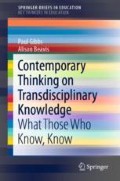Abstract
This chapter seeks to present a concise overview of the history and knowledge of transdisciplinarity. It is not intended to be extensive but to set the scene for the interviews that follows, contextualising the information from our key thinkers and providing a discussion of relevant contemporary themes.
Access this chapter
Tax calculation will be finalised at checkout
Purchases are for personal use only
Notes
- 1.
This separation coheres with the position taken by McGregor in this book; also, the notion of translation is central to the work of Maguire.
- 2.
A Bhaskar (2016) term that embraces a multiplicity of causes, mechanisms and theories.
References
Augsburg, T. (2014). Becoming transdisciplinary: The emergence of the transdisciplinary individual. World Futures, 70, 233–247.
Balsinger, P. (2004). Supradisciplinary research practices: History, objectives and rationale. Futures, 36, 407–421.
Bhaskar, R. (2016). Enlightened common sense: The philosophy of critical realism. Abingdon: Routledge.
Bruce, A., Lyall, C., Tait, J., & Williams, R. (2004). Interdisciplinary integration in Europe: The case of the Fifth Framework programme. Futures, 36, 457–470.
Costa, A. L., & Kallick, B. (2008). Learning and leading with habits of mind: 16 essential characteristics for success. Alexandria, VA: ASCD.
De Freitas, L., Morin, E., & Nicolescu, B. (1994). The charter of transdisciplinarity. Retrieved from International Encyclopedia of Religion & Science, http://inters.org/Freitas-Morin-Nicolescu-Transdisciplinarity.
Derry, S., & Fischer, G. (2005). Toward a model and theory of transdisciplinary graduate education. Paper presented at the American Educational Research Association Conference. Available at http://l3d.cs.colorado.edu/~gerhard/papers/transdisciplinary-sharon.pdf.
Foucault, M. (1981) The order of discourse. In R. Young (Ed.), Untying the text: A post-structuralism reader (pp. 51–78). London: Routledge & Kegan Paul.
Gibbons, M., Limoges, C., Nowotny, H., Schwartzman, S., Scott, P., & Trow, M. (1994). The new production of knowledge: The dynamics of science and research in contemporary societies. London, UK: Sage.
Gibbs, P. (2015) Transdisciplinary professional learning and practice. Springer.
Godemann, J. (2008). Knowledge integration: A key challenge for transdisciplinary cooperation. Environmental Education Research, 14(6), 625–641.
Jahn, T., Bergmann, N., & Keil, F. (2012). Transdisciplinarity: Between mainstreaming and marginalization. Ecological Economics, 79, 1–10.
Jantsch, E. (1970). Inter- and transdisciplinary university: A systems approach to education and innovation. Policy Sciences, 1, 403–428.
Jantsch, E. (1972). Towards interdisciplinarity and transdisciplinarity in education and innovation. In L. Apostell, G. Berger, A. Briggs, & G. Michaud (Eds.), Interdisciplinarity: Problems of teaching and research in universities (pp. 97–127). Paris: Centre for Educational Research and Innovation and OECD.
Klein, J. T. (2003). Unity of knowledge and transdisciplinarity: Contexts of definition, theory and the new discourse of problem solving. In G. H. Hadorn (Ed.), Unity of knowledge (in transdisciplinary research for sustainability) (Vol 1) (pp. 35–39). Paris, France: UNESCO EOLSS.
Klein, J. T. (2004). Prospects for transdisciplinarity. Futures, 36, 515–526.
Klein, J. T. (2014). Discourse of transdisciplinarity: Looking back to the future. Futures, 63, 68-74.
Lichnerowicz, A. (1972). Mathématique et transdisciplinarité. In L. Apostel, G. Berger, A. Briggs, & G. Michaud (Eds.), L’interdisciplinarité: Problémés d’eseigment et de recherche, Centre pour la Recherche et l’Innovation dans l’Enseignement (pp. 122–26). Paris: OCED.
McGregor, S. L. T. (2015) The Nicolescuian and Zurich approaches to transdisciplinarity. Integral Leadership Review, 15(2). Retrieved from http://integralleadershipreview.com/13135-616-the-nicolescuian-and-zurich-approaches-to-transdisciplinarity/.
McGregor, S. (2017). Transdisciplinary Pedagogy in Higher Education: Transdisciplinary Learning, Learning Cycles and Habits of Minds. In P. Gibbs (Ed.), Transdisciplinary higher education: A theoretical basis revealed in practice (pp. 3–16). Dordrecht: Springer.
Mercier, L. (2015). Introduction to Serres on transdisciplinarity. Theory, Culture & Society, 32(5–6), 37–40.
Mishra, P., Koehler, M. J., & Henriksen, D. (2011). The seven trans-disciplinary habits of mind: Extending the TPACK framework towards 21st century learning. Educational Technology, 11, 22–28.
Morin, E. (2006). Restricted Complexity, General Complexity (p. 16). Worldviews, Science and Us: Philosophy and Complexity.
Nicolescu, B. (2002). Manifesto of transdisciplinarity (K. C. Voss, Trans.). Albany, NY: State University of New York Press.
Osborne, P. (2015). Problematizing disciplinarity, transdisciplinary problematics. Theory, Culture & Society, 32(5–6), 3–35.
Piaget, J. (1972). L’epistémologié des relations interdisciplinaires. In L. Apostel, G. Berger, A. Briggs, & G. Michaud (Eds.), L’interdisciplinarité: Problémés d’eseigment et de recherche, Centre pour la Recherche et l’Innovation dans l’Enseignement (pp 144). Paris: OCED.
Papastephanou, M. (2013). Aristotelian gnoseology and work-based learning. In P. Gibbs (Ed.), Learning, work and practice: New understanding (pp. 107–120). Dordrecht: Springer.
Pohl, C. (2011). What is progress in transdisciplinary research? Futures, 43, 618–626.
Ravetz, J. R. (1999). What is Post-Normal Science. Futures, 31, 647–653.
Scott, D. (2017). Interdisciplinarity, transdisciplinarity and the higher education curriculum. In P. Gibbs (Ed.), Transdisciplinary higher education: A theoretical basis revealed in practice (pp. 32–44). Dordrecht: Springer.
Serres, M. (1974). Transdisciplinarity as relative exteriority. In La Traduction: Hermès III (pp. 152–157). Paris: Minuit (Trans. L. Mercier (2015). Theory Culture and Society, 36(5–6), 41–44).
Author information
Authors and Affiliations
Corresponding author
Rights and permissions
Copyright information
© 2020 The Author(s), under exclusive license to Springer Nature Switzerland AG
About this chapter
Cite this chapter
Beavis, A., Gibbs, P. (2020). Transdisciplinary Knowledge—An Emergent Concept. In: Contemporary Thinking on Transdisciplinary Knowledge. SpringerBriefs in Education(). Springer, Cham. https://doi.org/10.1007/978-3-030-39785-2_2
Download citation
DOI: https://doi.org/10.1007/978-3-030-39785-2_2
Published:
Publisher Name: Springer, Cham
Print ISBN: 978-3-030-39784-5
Online ISBN: 978-3-030-39785-2
eBook Packages: EducationEducation (R0)

